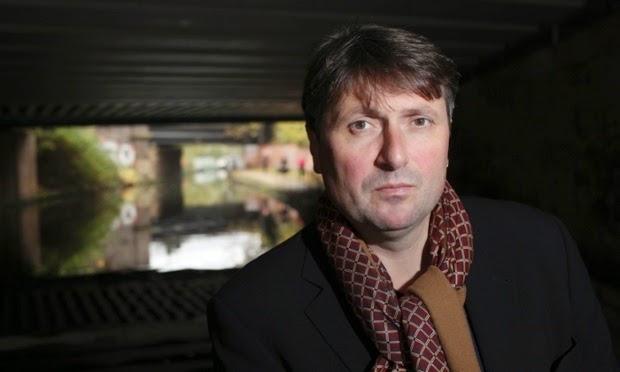"Heard the one about the guy from Marsden village?":
Simon Armitage's Paper Aeroplane: Selected Poems 1989-2014 - review
“How did it get so late?” wonders Simon Armitage in Paper Aeroplane, his new selected poems. It’s a fair question. The recent fanfare of the Next Generation Poets 2014, a promotion touting fresh voices set to dominate British verse, has coincided with Armitage, once poetry’s poster boy for the original New Generation Poets 1994, releasing this hefty retrospective. Twenty-five years have passed since he stunned the poetry world with his debut Zoom! (1989), his voice distinctive, his energetic style fully formed. Since then there have been: 10 book-length collections, a host of novels, plays, translations and memoirs, not to mention a clutch of TV and radio programmes. What surprises is how urgent and contemporary those early poems still read.
“Heard the one about the guy from Heaton Mersey?” hollers “Snow Joke”, the opener from Zoom!. From the outset, Armitage’s combination of coined phrases, cliche and zippy vernacular with a sharp adherence to meter, rhyme and form, worked to winsome effect, skimming across the living language with unmatched exuberance. Titles like “It Ain’t What You Do It’s What It Does to You” fizz next to frank opening lines: “Harold Garfinkel can go fuck himself” is a gunslinger’s free assessment of one leading sociologist. Here is a young poet as capable of ventriloquising the confessions of drug dealers in “The Stuff” as of figuring poetry itself, in the much-imitated “Zoom!”, as “a billiard ball weighing more than Saturn”.
Armitage’s followup, Kid (1992) reiterated that auspiciousness, not least in a penchant for showy idiom-coining and the apocryphal anecdote. “Brassneck” tells of a couple of rough-and-ready thieves working football crowds: “He keeps his cunt-hooks out of my wallet, / I keep my tentacles / out of his pocket”. But elsewhere, a sober lyric style starts to show, straining for literariness, as in the otherwise tender “At Sea”: “It is not through weeping, / but all evening the pale blue eye / on your most photogenic side has kept / its own unfathomable tide”. Phrase-making, comedy and a sure-footed music are still the exhilarating bait – the businessman in “Robinson’s Resignation” is “bored like the man who married a mermaid”; “Great Sporting Moments: The Treble” squeezes a laugh-out-loud gag into rhyming couplets that explore class conflict. Yet sometimes in Kid, and all too often in its successor, Book of Matches (1993), playful suggestion and nous give way to easy cliche and laboured wit. “I’ve made out a will; I’m leaving myself / to the National Health” proclaims one promising sonnet in an often patchy sequence, before wasting itself in mindless list-making: “They can have the lot, the whole stock: / the loops and coils and sprockets and springs and rods, / the twines and cords and strands, / the face, the case, the cogs and the hands”. This is writing that asks little of a poet of Armitage’s genuine gifts.
To his credit, however, Armitage has clearly taken a hedge-trimmer to most of the overgrowth of his oeuvre, much as he did in the overblown “Chainsaw versus the Pampas Grass”, from 2002’s The Universal Home Doctor. He may have come in for flak for inhabiting a poetic persona – street-smart, self-deprecating, no-nonsense – so fully and at times lazily that he has come to parody himself, but this selected poems proves that he has written some of the very best, most memorable poems of recent decades. Dropping the makeweight from uneven collections such as The Dead Sea Poems (1995) and Cloudcuckooland (1997) has left a handful of gems. Consider the cutting stand-up routine of “I Say I Say I Say”; the tongue-in-cheek life advice of “Goalkeeper with a Cigarette”; “The Tyre”, brimful of imaginative play and Hughes-like descriptive panache; and perhaps brightest of all, “Homecoming”, a metaphysical tale of memory and time-hopping intimacy that the great Louis MacNeice would surely have envied. These are major lyric poems by a writer who has had a game-changing influence on his contemporaries, and continues to cast a shadow over younger poets.
After a certain age, a poet’s chief rival is the poet they used to be. Seeing Stars, Armitage’s last collection proper, from 2010, is generously represented here, likely because the poet feels its wilfully surreal, flash-fiction narratives are an overdue departure. But aside its dazzling imagery and a couple of shorter, less showy pieces (including “The English Astronaut”, a sardonic commentary on the national character), its best bits still feel throwaway, circuitous and overwritten. Alongside excerpts from his lively versions of Homer’s Odyssey (2006) and Sir Gawain and the Green Knight (2007), it’s reassuring to find this selected poems close with work from a forthcoming collection, The Unaccompanied (2015). Here, the absurdist excesses of Seeing Stars are tempered, and alloyed to the lightly worn purposefulness that marks Armitage at his best. The mix of mock-antiquated tone and despair in “Poundland”, where “with wire-wrought baskets we voyaged”, “all under the clouded eye of CCTV”, is as entertaining as it is deadly serious social commentary.
For a writer who has often flippantly said that he wanted first to be a rock star, settling for poet instead, Paper Aeroplane proves that popular music’s dubious loss is most definitely British verse’s significant gain.
first published in The Guardian, Saturday 8 November 2014

